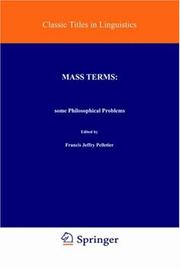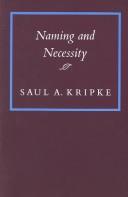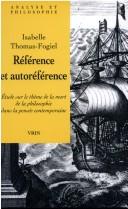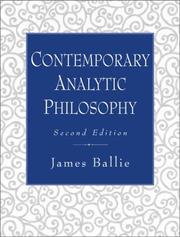| Listing 1 - 10 of 63 | << page >> |
Sort by
|
Book
Year: 1967 Publisher: London : Routledge and Kegan Paul,
Abstract | Keywords | Export | Availability | Bookmark
 Loading...
Loading...Choose an application
- Reference Manager
- EndNote
- RefWorks (Direct export to RefWorks)
Description (philosophie) --- Reference (philosophie) --- Description (philosophie) --- Reference (philosophie)
Book
ISBN: 9780367420246 Year: 2019 Publisher: London : Routledge,
Abstract | Keywords | Export | Availability | Bookmark
 Loading...
Loading...Choose an application
- Reference Manager
- EndNote
- RefWorks (Direct export to RefWorks)
Originally published in 1985. This study concerns the problem of treating identity as a relation between an object and itself. It addresses the Russellian and Fregean solutions and goes on to present in the first part a surfacist account of belief-context ambiguity requiring neither differences in relative scope nor distinctions between sense and reference. The second part offers an account of negative existentials, necessity and identity-statements which resolves problems unlike the Russell-Frege analyses. This is a detailed work in linguistics and philosophy.
Référence (philosophie) --- Proposition (logique) --- Signification (philosophie) --- Logique.
Book
ISBN: 0919491006 Year: 1980 Publisher: Guelph, Ont. : Canadian Association for Publishing in Philosophy,
Abstract | Keywords | Export | Availability | Bookmark
 Loading...
Loading...Choose an application
- Reference Manager
- EndNote
- RefWorks (Direct export to RefWorks)
Langage --- Philosophie du langage --- Référence (philosophie) --- Sémantique (philosolophie) --- Philosophie du langage --- Référence (philosophie) --- Sémantique (philosolophie)

ISBN: 9781402032653 Year: 2004 Publisher: New-York : Springer-Verlag,
Abstract | Keywords | Export | Availability | Bookmark
 Loading...
Loading...Choose an application
- Reference Manager
- EndNote
- RefWorks (Direct export to RefWorks)

ISBN: 0674598458 0674598466 Year: 1980 Publisher: Cambridge : Harvard University Press,
Abstract | Keywords | Export | Availability | Bookmark
 Loading...
Loading...Choose an application
- Reference Manager
- EndNote
- RefWorks (Direct export to RefWorks)
Nécessité --- Référence (philosophie) --- Identité (philosophie) --- Identity (Philosophical concept) --- Necessity (Philosophy) --- Reference (Philosophy) --- Nécessité (Philosophie) --- Référence (Philosophie) --- Identité --- Nécessité (Philosophie) --- Référence (Philosophie) --- Identité --- Nécessité.
Book
ISBN: 9780199693672 0199693676 0191739006 019870304X 9786613675736 0191629189 1280698772 Year: 2012 Publisher: Oxford : Oxford University Press,
Abstract | Keywords | Export | Availability | Bookmark
 Loading...
Loading...Choose an application
- Reference Manager
- EndNote
- RefWorks (Direct export to RefWorks)
John Hawthorne and David Manley present an original treatment of the semantic phenomenon of reference and the cognitive phenomenon of singular thought. In Part I, they argue against the idea that either is tied to a special relation of causal or epistemic acquaintance. Part II challenges the alleged semantic rift between definite and indefinite descriptions on the one hand, and names and demonstratives on the other--a division that has been motivated in part by appeals to considerations of acquaintance. Drawing on recent work in linguistics and philosophical semantics, Hawthorne and Manley explore a more unified account of all four types of expression according to which none of them paradigmatically fits the profile of a referential term. On the preferred framework put forward in The Reference Book, all four types of expression involve existential quantification but admit of uses that exhibit many of the traits associated with reference--a phenomenon that is due to the presence of what Hawthorne and Manley call a 'singular restriction' on the existentially quantified domain. The book concludes by drawing out some implications of the proposed semantic picture for the traditional categories of reference and singular thought.
Lexicology. Semantics --- Philosophy of language --- Reference (Philosophy) --- Référence (Philosophie) --- Reference (Philosophy). --- Référence (Philosophie)
Book
ISBN: 0631130055 Year: 1982 Publisher: Oxford : Blackwell,
Abstract | Keywords | Export | Availability | Bookmark
 Loading...
Loading...Choose an application
- Reference Manager
- EndNote
- RefWorks (Direct export to RefWorks)
Philosophy of language --- Référence (philosophie) --- Philosophie du langage ordinaire --- Logique --- Sémantique (philosophie) --- Philosophie

ISSN: 16242459 ISBN: 2711617858 9782711617852 Year: 2005 Volume: *2 Publisher: Paris : Librairie J. Vrin,
Abstract | Keywords | Export | Availability | Bookmark
 Loading...
Loading...Choose an application
- Reference Manager
- EndNote
- RefWorks (Direct export to RefWorks)
Analyser l’actuel thème de la fin de la philosophie pour mieux le mettre en cause puis en perspective, tel est l’objectif de ce livre. Analyser tout d’abord, en déployant le motif de la mort de la philosophie dans la diversité de ses variations actuelles (post-analytique, phénoménologique, etc.). Remettre en cause ensuite, en proposant une conception de la signification philosophique qui dépasse les paradoxes de l’énonciation inhérents aux positions envisagées. Mettre en perspective enfin, en retournant à la source historique de ces paradoxes, à la racine commune aux paradigmes les plus opposés, à savoir une pareille « course à la référence » au détriment d’une théorie minimale de l’autoréférence. Il s’agit donc de proposer un modèle pour aller vers la fin de la fin de la philosophie, c’est-à-dire vers la vie toujours recommencée.
Philosophy, Modern --- Reference (Philosophy) --- Philosophie --- Référence (Philosophie) --- #gsdbF --- Référence (Philosophie) --- Reflection (Philosophy)

ISBN: 9780130990686 013099068X Year: 2003 Publisher: Upper Saddle River, N.J. : Prentice Hall,
Abstract | Keywords | Export | Availability | Bookmark
 Loading...
Loading...Choose an application
- Reference Manager
- EndNote
- RefWorks (Direct export to RefWorks)
Analysis (Philosophy) --- Philosophie --- Positivisme logique. --- Atomisme logique. --- Signification (philosophie) --- Référence (philosophie) --- Sémantique (philosophie)
Book
Year: 2008 Publisher: Tunis : Faculté des Sciences Humaines et Sociales de Tunis,
Abstract | Keywords | Export | Availability | Bookmark
 Loading...
Loading...Choose an application
- Reference Manager
- EndNote
- RefWorks (Direct export to RefWorks)
| Listing 1 - 10 of 63 | << page >> |
Sort by
|

 Search
Search Feedback
Feedback About UniCat
About UniCat  Help
Help News
News